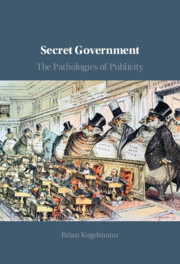Book contents
- Secret Government
- Secret Government
- Copyright page
- Dedication
- Contents
- Tables
- Acknowledgments
- Introduction
- Chapter 1 Publicity in History
- Chapter 2 Democracy Thrives in Darkness
- Chapter 3 Open versus Closed Deliberation
- Chapter 4 Publicity and the Rule of Law
- Chapter 5 Government House Moral Theory
- Chapter 6 Seeing Justice Done
- Chapter 7 Mutual Knowledge of Justice
- Chapter 8 Putting the Philosopher in the Model
- Conclusion
- References
- Index
Chapter 6 - Seeing Justice Done
Published online by Cambridge University Press: 04 November 2021
- Secret Government
- Secret Government
- Copyright page
- Dedication
- Contents
- Tables
- Acknowledgments
- Introduction
- Chapter 1 Publicity in History
- Chapter 2 Democracy Thrives in Darkness
- Chapter 3 Open versus Closed Deliberation
- Chapter 4 Publicity and the Rule of Law
- Chapter 5 Government House Moral Theory
- Chapter 6 Seeing Justice Done
- Chapter 7 Mutual Knowledge of Justice
- Chapter 8 Putting the Philosopher in the Model
- Conclusion
- References
- Index
Summary
A famous legal maxim holds that “justice should not only be done but should manifestly and undoubtedly be seen to be done.” On one understanding of the concept, publicity demands that this maxim also apply to questions of social, or distributive, justice. Not only must a just distribution be achieved, but persons must see that a just distribution has been achieved. John Rawls is a defender of this requirement, along with democratic theorist Thomas Christiano. There are compelling arguments in defense of this understanding of publicity. The problem is that there are many different ways of understanding what it means to see distributive justice done, and they all come with significant drawbacks. Perhaps these philosophers are correct that distributive justice must be seen to be done, but letting it be seen will require that we give up other things of value. This chapter highlights these difficult choices.
Keywords
- Type
- Chapter
- Information
- Secret GovernmentThe Pathologies of Publicity, pp. 140 - 166Publisher: Cambridge University PressPrint publication year: 2021

